英语单词前缀
英语单词前缀后缀词根表

英语单词前缀后缀词根表1、英语单词的前缀a-:表示“不、无”,如:Amorphous(无定形的)anti-:表示“反、对抗”,如:antiseptic(杀菌剂)bi-:表示“二、两个”,如:Bilateral(双边的)dys-:表示“不良、恶劣”,如:dyslexia(阅读障碍)extra-:表示“超出正常范围”,如:extramural(校外的)hyper-:表示“过多或过分”,如:hypercritical(极挑剔的)in-:表示“狭义、不”,如:inactive(不活跃的)inter-:表示“在……之间”,如:intercultural(跨文化的)iso-:表示“同等、相等”,如:isotope(同位素)macro-:表示“大规模或宏观”,如:macroeconomics(宏观经济学)micro-:表示“小规模或微观”,如:microphone(麦克风)multi-:表示“多个”,如:multifaceted(多方面的)non-:表示“不、非”,如:nonfiction(非小说)omni-:表示“全部的或普遍的”,如:omniscient(全知的)pre-:表示“在……之前”,如:preparation(准备)pro-:表示“赞成、支持”,如:progressive(进步的)pseudo-:表示“假、伪”,如:pseudopod(虚脓胞)re-:表示“对……重复”,如:replay(重播)sel-:表示“自己的、其自身的”,如:selective(选择性的)self-:表示“自己的、其自身的”,如:selfish(自私的)super-:表示“超越常规”,如:supervise(监督)trans-:表示“跨越边界”,如:transmit(传送)un-:表示“不、非”,如:unprecedented(史无前例的)2、英语单词的后缀-acy:表示“性质、特征”,如:sovereignty(主权)-age:表示“行为或行动”,如:encourage(鼓励)-al:表示“形容词”,如:national(国家的)-ful:表示“有……的”,如:beautiful(美丽的)-ible:表示“可以……的”,如:possible(可能的)-ion:表示“状态或过程”,如:invention(发明)-ist:表示“具有……性质的人”,如:capitalist(资本家)-ize:表示“使变成或以……处理”,如:organize(组织)-less:表示“无……特性的”,如:harmless(无害的)-ion:表示“状态或过程”,如:invention(发明)-ship:表示“职位、处所”,如:friendship(友谊)-ure:表示“行为或结果”,如:failure(失败)-y:表示“状态”,如:happy(开心的)3、英语单词的词根Amorph:表示“无定形的”,如:amorphous(无定形的)Arch-:表示“最高的”,如:archetype(原型)bio-:表示“生物的”,如:biologist(生物学家)centr–:表示“中心”,如:central(中心的)chrom-:表示“色彩”,如:chromosome(染色体)chron-:表示“时间”,如:chronological(时间的)dem-:表示。
英语单词49个前缀
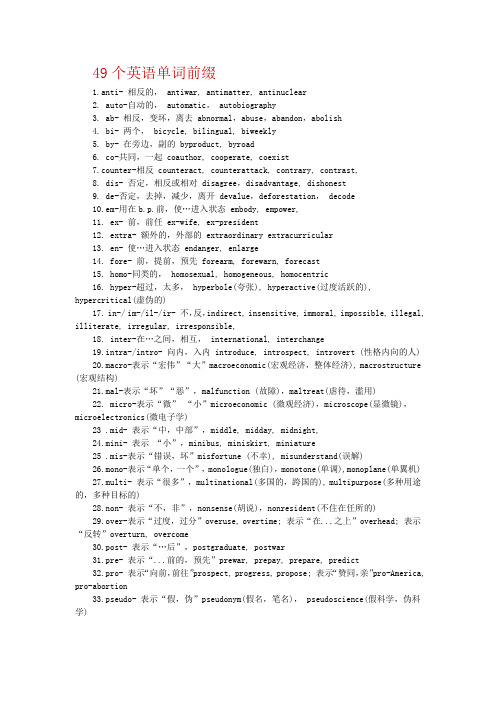
49个英语单词前缀1.anti- 相反的, antiwar, antimatter, antinuclear2. auto-自动的, automatic, autobiography3. ab- 相反,变坏,离去 abnormal,abuse,abandon,abolish4. bi- 两个, bicycle, bilingual, biweekly5. by- 在旁边,副的 byproduct, byroad6. co-共同,一起 coauthor, cooperate, coexist7.counter-相反 counteract, counterattack, contrary, contrast,8. dis- 否定,相反或相对 disagree,disadvantage, dishonest9. de-否定,去掉,减少,离开 devalue,deforestation, decode10.em-用在b.p.前,使…进入状态 embody, empower,11. ex- 前,前任 ex-wife, ex-president12. extra- 额外的,外部的 extraordinary extracurricular13. en- 使…进入状态 endanger, enlarge14. fore- 前,提前,预先 forearm, forewarn, forecast15. homo-同类的, homosexual, homogeneous, homocentric16. hyper-超过,太多, hyperbole(夸张), hyperactive(过度活跃的),hypercritical(虚伪的)17. in-/ im-/il-/ir- 不,反,indirect, insensitive, immoral, impossible, illegal, illiterate, irregular, irresponsible,18. inter-在…之间,相互, international, interchange19.intra-/intro- 向内,入内 introduce, introspect, introvert (性格内向的人)20.macro-表示“宏伟”“大”macroeconomic(宏观经济,整体经济), macrostructure (宏观结构)21.mal-表示“坏”“恶”,malfunction (故障),maltreat(虐待,滥用)22. micro-表示“微”“小”microeconomic (微观经济),microscope(显微镜),microelectronics(微电子学)23 .mid- 表示“中,中部”,middle, midday, midnight,24.mini- 表示“小”,minibus, miniskirt, miniature25 .mis-表示“错误,坏”misfortune (不幸), misunderstand(误解)26.mono-表示“单个,一个”,monologue(独白),monotone(单调),monoplane(单翼机)27.multi- 表示“很多”,multinational(多国的,跨国的), multipurpose(多种用途的,多种目标的)28.non- 表示“不,非”,nonsense(胡说),nonresident(不住在任所的)29.over-表示“过度,过分”overuse, overtime; 表示“在...之上”overhead; 表示“反转”overturn, overcome30.post- 表示“…后”,postgraduate, postwar31.pre- 表示“...前的,预先”prewar, prepay, prepare, predict32.pro- 表示“向前,前往”prospect, progress, propose; 表示“赞同,亲”pro-America, pro-abortion33.pseudo- 表示“假,伪”pseudonym(假名,笔名), pseudoscience(假科学,伪科学)34.re- 表示“一再,重新”reuse, reunite, rebuild; “向后,相反,不”reject, refuse, rebel35.self-表示“自己,自身”,self-employed(自己经营的),self-taught(自学而成的,自修的)36.semi-表示“半,不完全地”,semicircle(半圆形), semifinal(半决赛)37.step-表示“后,继”stepmother, stepchildren38.sub-表示“下,在下;低于,副,亚,次”subdivide(再分,细分) subsection(分部,小部分), subway39.super- 表示“在…之上,加之”supermarket, supernatural (超自然的)40.sur-表示“超过,在上面”,surface, surpass(超越,胜过),surmount(战胜,克服),surcharge(超载,追加罚款)41.tele-表示“远”,telecommunication(电讯,远程通讯), telescope42.therm(o)-表示“热,热电”,thermometer (温度计,体温计),thermochemistry(热化学)43.trans-表示“横过,穿过”,transplant, transport, transnational, transatlantic(大西洋彼岸的)44.tri-表示“三”,triangle, tricycle45. ultra- 表示“极端,过度” ultramodern (超级现代化),ultrasound(超音,超声波) ultra-democracy(极端民主),46. un- 表示“不,非,无” unreal, uncomfortable, unfortunate, unconditional (无条件的)47. under- 表示“在…之下,次于,不足” underground,underdeveloped, undersea,underline48. uni-表示“单一” uniform, unidirectional (单向的),united (一致的,统一的,团结的)49.vice- 表示“副” vice-chairman,vice-governor , vice-president。
英语单词前缀

Aa不、无、非,在.......,........的ab-离开,表强调意义ab-,ac-,ad-,af-,ag-,an-,ap-,ar-,as-,at-表示强调(加在同辅音字母的词前)ambi-在......两边anti-反对,相反anthropo-人类,人Bbe-使.....成为(构成动词)bi-两个,两Cco-,col-,cor-,com-,con-共同contr-反对,相反counter-反对counterbalance 平衡Dde-去掉,向下devalue 降低价值decode 破译di-两个,双dilemma 窘境,困境di-分开,离开dia-在两者之间dialogue 对话dis-不,消失掉dis-分开,分离Eem-,en-进入....之中,包围em-,en-使....进入状态ex-前面的,前任的exo-外部的,外面exoteric 外界的,外面的Ffore-前面,预先Hhetero-异类,异种hemi-半homo-同类的hyper-超过,太多Iil-,ir-不,无(放在同辅音词根前)ir-使......,成为,进入im-,in-不,无,非im-,in-向内,进入inter-在........之间,相互intro-向内,入内introvert 内向的人Kkilo-一千kilogram 公斤kilometer 公里Mmacro-宏伟,大meta-超过,改变micro-微,小mill-千,千分之一mini-小mis-错误,坏mono-单个,一个multi-很多,很多Nnon-不,非nonexistent 不存在的Oob-离,不out-超过,过度out-出去,过时over-过度,过分over-在......之上over-翻转Ppan-广泛的para-在旁边penta-五per-完全,贯穿,自始自终post-在后面post-邮件,邮政pre-.....前的,预先pro-向前,在前Rre-向后,相反,不re-表强调,重新Sse-分开,离开,区别开semi-半supra-超sub-在下面,次一等,副手sur-超过,在上面super-超级,超过,过度,在......上面sym-,syn-共同,相同Ttrans-横过,越过,跨越trans-交换,变换,改变,转移tri-三triple三倍数,三倍的twi-二,两Uun-不,无,非,没有un-打开,解开,弄出under-在.....下under-不足,不够Vvice-副vice-president 副总统。
英语单词构词法前后缀
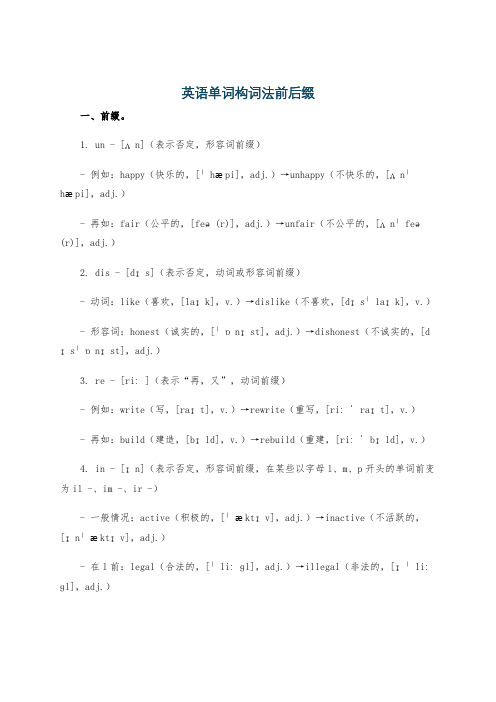
英语单词构词法前后缀一、前缀。
1. un - [ʌn](表示否定,形容词前缀)- 例如:happy(快乐的,[ˈhæpi],adj.)→unhappy(不快乐的,[ʌnˈhæpi],adj.)- 再如:fair(公平的,[feə(r)],adj.)→unfair(不公平的,[ʌnˈfeə(r)],adj.)2. dis - [dɪs](表示否定,动词或形容词前缀)- 动词:like(喜欢,[laɪk],v.)→dislike(不喜欢,[dɪsˈlaɪk],v.)- 形容词:honest(诚实的,[ˈɒnɪst],adj.)→dishonest(不诚实的,[d ɪsˈɒnɪst],adj.)3. re - [riː](表示“再,又”,动词前缀)- 例如:write(写,[raɪt],v.)→rewrite(重写,[riːˈraɪt],v.)- 再如:build(建造,[bɪld],v.)→rebuild(重建,[riːˈbɪld],v.)4. in - [ɪn](表示否定,形容词前缀,在某些以字母l、m、p开头的单词前变为il -、im -、ir -)- 一般情况:active(积极的,[ˈæktɪv],adj.)→inactive(不活跃的,[ɪnˈæktɪv],adj.)- 在l前:legal(合法的,[ˈliːɡl],adj.)→illegal(非法的,[ɪˈliːɡl],adj.)- 在m前:moral(道德的,[ˈmɒrəl],adj.)→immoral(不道德的,[ɪˈm ɒrəl],adj.)- 在r前:regular(规则的,[ˈreɡjələ(r)],adj.)→irregular(不规则的,[ɪˈreɡjələ(r)],adj.)5. pre - [priː](表示“在……之前”,形容词或动词前缀)- 形容词:school(学校,[skuːl])→preschool(学前的,[ˈpriːskuːl],adj.)- 动词:pay(支付,[peɪ],v.)→prepay(预付,[priːˈpeɪ],v.)6. post - [pəʊst](表示“在……之后”,形容词或名词前缀)- 形容词:war(战争,[wɔː(r)])→post - war(战后的,[ˈpəʊst wɔː(r)],adj.)- 名词:graduate(毕业生,[ˈɡrædʒuət])→postgraduate(研究生,[ˌp əʊstˈɡrædʒuət],n.)二、后缀。
英语单词常见的前缀后缀总结
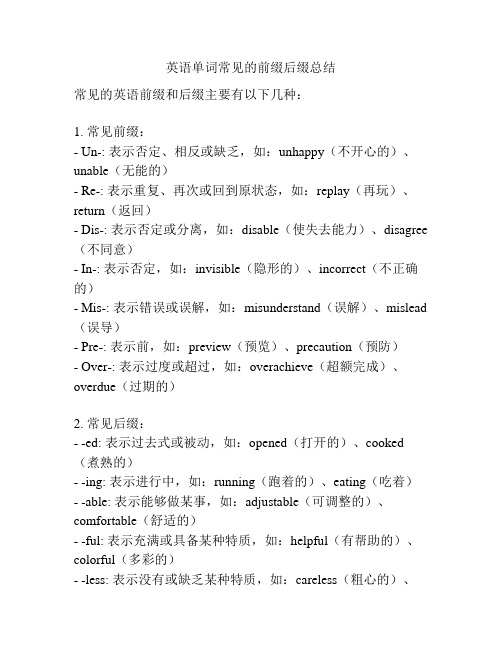
英语单词常见的前缀后缀总结常见的英语前缀和后缀主要有以下几种:1. 常见前缀:- Un-: 表示否定、相反或缺乏,如:unhappy(不开心的)、unable(无能的)- Re-: 表示重复、再次或回到原状态,如:replay(再玩)、return(返回)- Dis-: 表示否定或分离,如:disable(使失去能力)、disagree (不同意)- In-: 表示否定,如:invisible(隐形的)、incorrect(不正确的)- Mis-: 表示错误或误解,如:misunderstand(误解)、mislead (误导)- Pre-: 表示前,如:preview(预览)、precaution(预防)- Over-: 表示过度或超过,如:overachieve(超额完成)、overdue(过期的)2. 常见后缀:- -ed: 表示过去式或被动,如:opened(打开的)、cooked (煮熟的)- -ing: 表示进行中,如:running(跑着的)、eating(吃着)- -able: 表示能够做某事,如:adjustable(可调整的)、comfortable(舒适的)- -ful: 表示充满或具备某种特质,如:helpful(有帮助的)、colorful(多彩的)- -less: 表示没有或缺乏某种特质,如:careless(粗心的)、useless(无用的)- -ment: 表示行为或状态,如:enjoyment(享受)、improvement(改善)- -er/-or: 表示某种职业或身份,如:teacher(教师)、actor (演员)需要注意的是,不同的前缀和后缀可以与词根结合,形成不同的词义。
在学习英语时,了解常见的前缀和后缀有助于加深对单词的理解和记忆。
英语单词的前缀和后缀

英语单词的前缀和后缀一、常见前缀。
1. un -- 音标:[ʌn]- 词性:可加在形容词、副词、名词前,表示否定。
- 例如:unhappy [ʌnˈhæpi](adj. 不快乐的),unusually [ʌnˈju:ʒuəli](adv. 不寻常地),unemployment [ˌʌnɪmˈplɔɪmənt](n. 失业)2. re -- 音标:[riː]- 词性:可加在动词前,表示“再,又;重新”。
- 例如:rewrite [ˌriːˈraɪt](v. 重写),rebuild [ˌriːˈbɪld](v. 重建)3. dis -- 音标:[dɪs]- 词性:可加在动词、形容词、名词前,表示否定或相反的意思。
- 例如:dislike [dɪsˈlaɪk](v. 不喜欢;n. 厌恶),disappear [ˌdɪs əˈpɪə(r)](v. 消失),dishonest [dɪsˈɒnɪst](adj. 不诚实的)4. in -(在字母l、m、p前变为im -,在字母r前变为ir -,在字母b、n、p前变为il -)- in -音标:[ɪn],im -音标:[ɪm],il -音标:[ɪl],ir -音标:[ɪr]- 词性:可加在形容词前,表示否定。
- 例如:inactive [ɪnˈæktɪv](adj. 不活跃的),impossible [ɪmˈpɒs əbl](adj. 不可能的),illegal [ɪˈliːgl](adj. 非法的),irregular [ɪˈreɡjələ(r)](adj. 不规则的)5. pre -- 音标:[priː]- 词性:可加在动词、名词、形容词前,表示“在……之前”。
- 例如:preview [ˈpriːvjuː](v. 预习;n. 预演),prewar [ˈpriːwɔː(r)](adj. 战前的)6. post -- 音标:[pəʊst]- 词性:可加在名词、形容词前,表示“在……之后”。
英语单词前缀

英语单词前缀-CAL-FENGHAI.-(YICAI)-Company One11 re-(1).表示"回"或"向后"的意思。
例如:return(回来,返回)recall(回忆,召回)retract(缩回,取回)(2).表示"再"、"重新"、"重复"的意思。
例如:review(复习)reunion(团圆,重聚)restart(重新开始)reconstruction(重建)(3).表示"相反"、"反对"的意思。
例如: rebel(反叛,谋反)reverse(反转,颠倒)resist(反抗,抵抗)2 ex-:(1).表示"出"、"外"、"由……中弄出"。
例如:export(出口,输出) extract(抽出,拔出) expel(逐出,赶出)(2).表示"前任的,以前的"。
例如: ex-president(前任总统) ex-soldier(退伍军人) ex-husband (前夫)ex-mayor (前任市长) ex-wife (前妻) ex-Nazis (前纳粹分子)3 anti-anti-表示"反对"、"相反"或"防止"。
例如:antiwar(反战的) anti-colonial [kə'ləunjəl](反殖民主义的) antifat(防止肥胖的) antimissile(反导弹)4 macro-与micro-macro-与micro-是一对意义相反的前缀,macro-表示"宏、大";micro-表示"微"。
例如:Macro-world(宏观世界) macroeconomics(宏观经济学) macroscale(大规模) microscope(显微镜) microworld(微观世界) microelement(微量元素)5 trans-trans-有两个意义:(1).表示"转变"、"变换"。
英语单词前缀
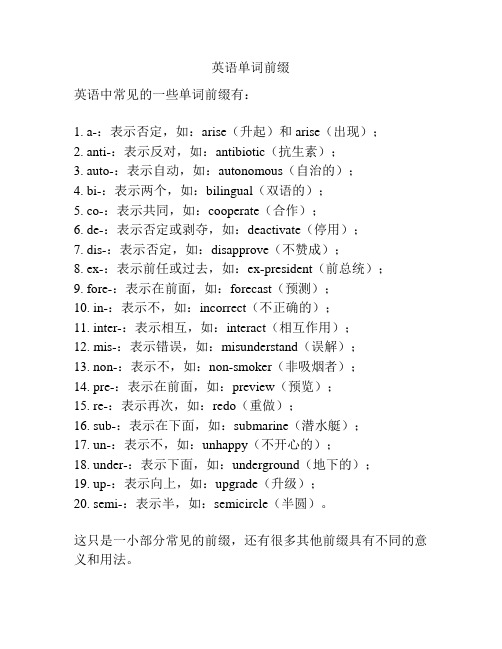
英语单词前缀
英语中常见的一些单词前缀有:
1. a-:表示否定,如:arise(升起)和arise(出现);
2. anti-:表示反对,如:antibiotic(抗生素);
3. auto-:表示自动,如:autonomous(自治的);
4. bi-:表示两个,如:bilingual(双语的);
5. co-:表示共同,如:cooperate(合作);
6. de-:表示否定或剥夺,如:deactivate(停用);
7. dis-:表示否定,如:disapprove(不赞成);
8. ex-:表示前任或过去,如:ex-president(前总统);
9. fore-:表示在前面,如:forecast(预测);
10. in-:表示不,如:incorrect(不正确的);
11. inter-:表示相互,如:interact(相互作用);
12. mis-:表示错误,如:misunderstand(误解);
13. non-:表示不,如:non-smoker(非吸烟者);
14. pre-:表示在前面,如:preview(预览);
15. re-:表示再次,如:redo(重做);
16. sub-:表示在下面,如:submarine(潜水艇);
17. un-:表示不,如:unhappy(不开心的);
18. under-:表示下面,如:underground(地下的);
19. up-:表示向上,如:upgrade(升级);
20. semi-:表示半,如:semicircle(半圆)。
这只是一小部分常见的前缀,还有很多其他前缀具有不同的意义和用法。
英语单词前缀的意义

英语单词前缀的意义
英语单词前缀是指添加在词根前面的一个或多个字母组合,用于改变词的含义或形成新的词。
前缀可以起到修饰、否定、逆转、增加或改变词义的作用。
下面是一些常见的英语单词前缀及其意义:
1. un-:表示否定或相反。
例如:unhappy(不快乐的)、
unfair(不公平的)。
2. re-:表示重复、再次、回到原来状态。
例如:replay(重新
播放)、return(返回)。
3. pre-:表示预先、在前面。
例如:preheat(预热)、prepay (预付)。
4. dis-:表示分离、不、否定。
例如:dislike(不喜欢的)、disconnect(断开连接)。
5. mis-:表示错误、不正确。
例如:misunderstand(误解)、misidentify(误认)。
6. in-/im-/il-/ir-:表示否定、不。
例如:invisible(不可见的)、impatient(不耐烦的)。
7. de-:表示去除、分开。
例如:defrost(解冻)、detach(分离)。
8. un-:表示相反。
例如:unusual(不寻常的)、unusual(不善于)。
9. over-:表示超过、过度。
例如:overcook(煮过头)、overcome(战胜)。
10. inter-:表示互相、相互。
例如:interact(互动)、interconnect(相互连接)。
这些是常见的英语单词前缀,它们可以结合不同的词根形成不同的单词,并赋予这些单词新的含义。
英语单词 前缀

英语单词前缀一、“un -”(表示否定)1. 音标:[ʌn]2. 词性示例。
- unhappy(形容词,adj.):[ʌnˈhæpi],意思是“不快乐的”。
- unlock(动词,v.):[ˌʌnˈlɒk],表示“开锁;开启”。
二、“re -”(表示再次、重新)1. 音标:[riː]2. 词性示例。
- rewrite(动词,v.):[ˌriːˈraɪt],意为“重写;改写”。
- review(动词,v.;名词,n.):[rɪˈvjuː],作动词时表示“复习;回顾”,作名词时表示“复习;评论”。
三、“pre -”(表示在……之前)1. 音标:[priː]2. 词性示例。
- prewar(形容词,adj.):[ˌpriːˈwɔː(r)],“战前的”。
- predict(动词,v.):[prɪˈdɪkt],“预测;预言”。
四、“dis -”(表示否定、相反)1. 音标:[dɪs]2. 词性示例。
- dislike(动词,v.;名词,n.):[dɪsˈlaɪk],作动词时表示“不喜欢”,作名词时表示“厌恶”。
- disappear(动词,v.):[ˌdɪsəˈpɪə(r)],“消失;不见”。
五、“in -”(表示否定,在某些词中为“il -”“im -”“ir -”,取决于后面词根的首字母)1. 音标:[ɪn]([ɪl]、[ɪm]、[ɪr]根据具体情况)2. 词性示例。
- incorrect(形容词,adj.):[ˌɪnkəˈrekt],“不正确的”。
- illegal(形容词,adj.):[ɪˈliːɡl],“非法的”。
- impossible(形容词,adj.):[ɪmˈpɒsəbl],“不可能的”。
- irregular(形容词,adj.):[ɪˈreɡjələ(r)],“不规则的”。
常见的英语单词前缀整理

常见的英语单词前缀整理英语是一种西日耳曼语支,最早被中世纪的英国使用,并因其广阔的殖民地而成为世界使用面积最广的语言。
下面是店铺帮大家整理的常见的英语单词前缀整理,仅供参考,大家一起来看看吧。
常见的英语单词前缀整理11.表示否定意义的前缀1)纯否定前缀a-, an-, asymmetry(不对称)anhydrous(无水的)dis- dishonest, dislikein-, ig-, il, im, ir, incapable, inability, ignoble, impossible, immoral, illegal, irregularne-, n-, none, neither, nevernon-, noesenseneg-, neglectun- unable, unemployment2)表示错误的意义male-, mal-, malfunction, maladjustment(失调)mis-, mistake, misleadpseudo-, pseudonym(假名), pseudoscience3)表示反动作的意思de-, defend, demodulation(解调)dis-, disarm, disconnectun-, unload, uncover4)表示相反,相互对立意思anti-, ant- antiknock( 防震), antiforeign ,(排外的)contra-, contre-, contro-, contradiction, controflow(逆流)counter-, counterreaction, counterbalanceob-, oc-, of-, op-, object, oppose, occupywith-, withdraw, withstand2. 表示空间位置,方向关系的前缀1)a- 表示“在……之上”,“向……”aboard, aside,2)by- 表示“附近,邻近,边侧”bypath, bypass(弯路)3)circum-, circu-, 表示“周围,环绕,回转”circumstance, circuit4)de-, 表示“在下,向下”descend, degrade5)en-, 表示“在内,进入”encage, enbed(上床)6)ex-, ec-, es-, 表示“外部,外”exit, eclipse, expand, export7)extra-, 表示“额外”extraction (提取)8)fore- 表示“在前面”forehead, foreground9)in-, il-, im-, ir-, 表示“向内,在内,背于”inland, invade, inside, import10)inter-, intel-, 表示“在……间,相互”international, interaction, internet11)intro-, 表示“向内,在内,内侧”introduce, introduce12)medi-, med-, mid-, 表示“中,中间”Mediterranean, midposition13)out-, 表示“在上面,在外部,在外”outline, outside, outward14)over-, 表示“在上面,在外部,向上”overlook, overhead, overboard15)post-, 表示"向后,在后边,次”postscript(附言),16)pre-, 表示"在前”在前面”prefix, preface, preposition17)pro-, 表示“在前,向前”progress, proceed,18)sub-, suc-, suf-, sug-, sum-, sup-, sur-, sus-, 表示“在下面,下”subway, submarine, suffix, suppress, supplement19)super-, sur-, 表示“在…..之上”superficial, surface, superstructure20)trans-, 表示“移上,转上,在那一边”translate, transform, transoceanic21)under-, 表示“在…..下面,下的”underline, underground, underwater22)up-, 表示“向上,向上面,在上”upward, uphold, uphill(上坡)3. 表示时间,序列关系的前缀1)ante-, anti-, 表示“先前,早于,预先”antecedent, anticipate,2)ex-, 表示“先,故,旧”expresident, exhusband3)fore-, 表示“在前面,先前,前面”foreward, dorecast, foretell(预言)4)mid-, medi-, 表示“中,中间”midnight, midsummer5)post-"表示“在后,后”postwar,6)pre-, pri-, 表示“在前,事先,预先”preheat, prewar, prehistory7)pro-, 表示“在前,先,前”prologue (序幕),prophet(预言家)8)re-, 表示“再一次,重新”retell, rewrite4. 表示比较程度差别关系的前缀1)by-, 表示“副,次要的”byproduct, bywork(副业)2)extra-,表示“超越,额外”extraordinary,3)hyper- 表示“超过,极度”hypersonic(超声波), hypertesion(高血压)4)out-,表示“超过,过分”outdo(超过), outbid(出价过高的.人)5)over-,表示“超过,过度,太”overeat, overdress, oversleep6) sub-, suc-, sur-, 表示“低,次,副,亚”subeditor, subordinate, subtropical(亚热带)7)super-, sur- 表示“超过”supernature, superpower, surplus, surpass8)under-,表示“低劣,低下”undersize, undergrown, underproduction(生产不足) 9)vice- 表示“副,次”vicepresident, vicechairman5. 表示共同,相等意思的前缀1)com-, cop-, con-, cor-, co- 表示“共同,一起”。
英语单词中,常用的前缀和后缀50个
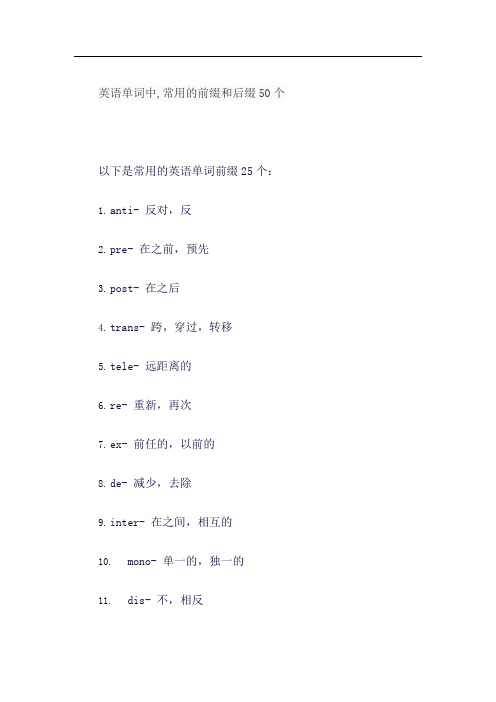
英语单词中,常用的前缀和后缀50个以下是常用的英语单词前缀25个:1.anti- 反对,反2.pre- 在之前,预先3.post- 在之后4.trans- 跨,穿过,转移5.tele- 远距离的6.re- 重新,再次7.ex- 前任的,以前的8.de- 减少,去除9.inter- 在之间,相互的10.mono- 单一的,独一的11.dis- 不,相反12.en- 使成为,使进入13.a- 表示“在...之上”,“在...之中”14.in- 表示“在...之内”,“缺乏”15.under- 表示“在...之下”,“不足”16.over- 表示“在...之上”,“超过”17.out- 表示“向外”,“出来”18.up- 表示“向上”,“起来”19.down- 表示“向下”,“下去”20.off- 表示“离开”,“脱落”21.to- 表示“向...”,“到...为止”22.from- 表示“来自...”,“由...开始”23.by- 表示“由...”,“被...”24.for- 表示“为了...”,“当作”25.through- 表示“通过...”,“自始至终”以下是常用的英语单词后缀25个:1.-ness 状态或性质2.-tion 动或过程的结果3.-ity 性质或状态4.-ism 表示"主义"或"宗教"5.-ity 表示"行为"、"状态"或"性质"6.-ity 表示"名词化"7.-ing 表示"行为"、"状态"或"性质"8.-al 动作的结果或情况9.-ar 通常的意思或情况10.-or 行为的人或物11.-er 动作的人或物12.-en 使变成,行为使…变得…13.-ant 表示行为、状态、品质、思想等14.-ent 表示人、物、行为等15.-ive 有…性质的,有…作用的16.-ic 形容词后缀,表示…的17.-id 与…相同的,具有…性质的18.-ous 多音节的形容词后缀,表示…的19.-ful 形容词后缀,表示充满的、有…性质的20.-less 没有…的,不…的21.-ley 名词后缀,表示在…地方、在…情况下22.-ity 名词后缀,表示性质、状态等23.-ness 名词后缀,表示状态、性质、情况等24.-ship 名词后缀,表示某种技能、资格等25.-ing 名词后缀,表示行为、事情等。
常见的英语单词前缀

常见的英语单词前缀(prefix)1.表示否定意义的前缀1)纯否定前缀a-, an-, asymmetry(不对称)anhydrous(无水的)dis- dishonest, dislikein-, ig-, il, im, ir,incapable, inability, ignoble, impossible, immoral, illegal, irregularne-, n-, none, neither, nevernon-, noesenseneg-, neglectun- unable, unemployment2)表示错误的意义male-, mal-, malfunction, maladjustment(失调)mis-, mistake, misleadpseudo-, pseudonym(假名), pseudoscience3)表示反动作的意思de-, defend, demodulation(解调)dis-, disarm, disconnectun-, unload, uncover4)表示相反,相互对立意思anti-, ant-antiknock( 防震), antiforeign ,(排外的)contra-, contre-, contro-, contradiction, controflow(逆流)counter-, counterreaction, counterbalanceob-, oc-, of-, op-, object, oppose, occupywith-, withdraw(撤回,提款), withstand(对抗,艰受)2. 表示空间位置,方向关系的前缀1)a- 表示“在……之上”,“向……”aboard, aside,2)by- 表示“附近,邻近,边侧” bypath, bypass(弯路)3)circum-, circu-, 表示“周围,环绕,回转”circumstance, circuit4)de-, 表示“在下,向下” descend, degrade5)en-, 表示“在内,进入”encage(禁闭), enbed(上床)6)ex-, ec-, es-, 表示“外部,外”exit, eclipse, expand, export7)extra-, 表示“额外”extraction (提取)8)fore- 表示“在前面”forehead, foreground9)in-, il-, im-, ir-, 表示“向内,在内,背于”inland, invade, inside, import10)inter-, intel-, 表示“在……间,相互”international, interaction, internet11)intro-, 表示“向内,在内,内侧”introduce, introduce12)medi-, med-, mid-, 表示“中,中间”Mediterranean, midposition13)out-, 表示“在上面,在外部,在外”outline, outside, outward14)over-, 表示“在上面,在外部,向上”overlook, overhead, overboard15)post-, 表示"向后,在后边,次”postscript(附言),16)pre-, 表示"在前”在前面”prefix, preface, preposition17)pro-, 表示“在前,向前”progress, proceed,18)sub-, suc-, suf-, sug-, sum-, sup-, sur-, sus-, 表示“在下面,下”subway, submarine, suffix, suppress, supplement19)super-, sur-, 表示“在…..之上”superficial, surface, superstructure20)trans-, 表示“移上,转上,在那一边”translate, transform, transoceanic21)under-, 表示“在…..下面,下的”underline, underground,underwater22)up-, 表示“向上,向上面,在上”upward, uphold, uphill(上坡)3. 表示时间,序列关系的前缀1)ante-, anti-, 表示“先前,早于,预先”antecedent, anticipate,2)ex-, 表示“先,故,旧”expresident, exhusband3)fore-, 表示“在前面,先前,前面”foreward, dorecast, foretell(预言)4)mid-, medi-, 表示“中,中间”midnight, midsummer5)post-"表示“在后,后”postwar,6)pre-, pri-, 表示“在前,事先,预先”preheat, prewar, prehistory7)pro-, 表示“在前,先,前”prologue (序幕),prophet(预言家)8)re-, 表示“再一次,重新”retell, rewrite4. 表示比较程度差别关系的前缀1)by-, 表示“副,次要的”byproduct, bywork(副业)2)extra-,表示“超越,额外”extraordinary,3)hyper- 表示“超过,极度”hypersonic(超声波), hypertesion(高血压)4)out-,表示“超过,过分”outdo(超过), outbid(出价过高的人)5)over-,表示“超过,过度,太”overeat, overdress, oversleep6) sub-, suc-, sur-,?? 表示“低,次,副,亚”subeditor, subordinate, subtropical(亚热带)7)super-, sur- 表示“超过”Supernature , superpower , surplus , surpass8)under-,表示“低劣,低下”undersize, undergrown, underproduction(生产不足)9)vice- 表示“副,次”vicepresident, vicechairman5. 表示共同,相等意思的前缀1)com-, cop-, con-, cor-, co- 表示“共同,一起”。
英语单词前缀总结

英语单词前缀总结
一个英语单词可以分为三个部分:前缀,词根,后缀;单词中位于词根前面的部分就是前缀,前缀可以改变单词的意思。
后缀又称词尾,是一种后置于其他词素后的词缀。
扩展资料
英语单词前缀:
1、a- 在……之上 aboard prep. 在(船、飞机、车)上
2、ab-, abs- 离开,偏离 abnormal a. 反常的
3、anti- 先 anticipate vt. 预期
4、ac-, ad-, af-, ag-, ap-, ar-, as-, at-表加强意 accuse vt. 指控
5、bene- 好 beneficial a. 有益的
6、bio- 生命 biology n. 生物学
7、cata- 向下 catalog(ue) n. 目录
8、col-, com-, con-, co-, cor- 共同,一起 combat n. 战斗
9、contra- 相反 contrast v. 对比,对照
10、de- 离;加强词意 depart vi. 离开;背离
11、di-, dif-, dis- 分开 discard vt. 丢弃
12、dia- 穿过 diameter n. 直径
13、e-, ef-, ex- 出,出来export v. 出口
14、em-, en- 在……之中;使…… enclose vt. 围住
15、fore- 前 forehead n. 前额。
英语单词常见前后缀及含义

英语单词常见前后缀及含义一、常见前缀。
1. un - [ʌn](否定前缀,形容词或动词)- 含义:表示“不,无,非”。
- 例词:- unhappy [ʌnˈhæpi](形容词),意为“不快乐的”。
- unlock [ˌʌnˈlɒk](动词),表示“开锁;开启”。
2. dis - [dɪs](否定前缀,动词、形容词、名词)- 含义:表示“不,相反”。
- 例词:- dislike [dɪsˈlaɪk](动词),意思是“不喜欢”。
- dishonest [dɪsˈɒnɪst](形容词),表示“不诚实的”。
- disadvantage [ˌdɪsədˈvɑ:ntɪdʒ](名词),意为“不利条件”。
3. in - [ɪn](否定前缀,形容词),在字母l前变为il - [ɪl],在字母m、p前变为im - [ɪm],在字母r前变为ir - [ɪr]- 含义:表示“不,无”。
- 例词:- incorrect [ˌɪnkəˈrekt](形容词),意思是“不正确的”。
- illegal [ɪˈli:gl](形容词),表示“非法的”。
- impossible [ɪmˈpɒsəbl](形容词),意为“不可能的”。
- irregular [ɪˈreɡjələ(r)](形容词),表示“不规则的”。
4. re - [ri:](动词前缀)- 含义:表示“再,又;重新”。
- 例词:- rewrite [ˌri:ˈraɪt](动词),意为“重写”。
- review [rɪˈvju:](动词),表示“复习;回顾”。
5. pre - [pri:](前缀,形容词、动词、名词)- 含义:表示“在……之前”。
- 例词:- pre - war [ˈpri: wɔ:(r)](形容词),意思是“战前的”。
- preview [ˈpri:vju:](动词),表示“预习;预演”。
- preposition [ˌprepəˈzɪʃn](名词),意为“介词”。
常见英语单词前缀

re-1.表示"回"或"向后"的意思。
例如:return(回来,返回)recall(回忆,召回)retrac t(缩回,取回)2.表示"再"、"重新"、"重复"的意思。
例如:review(复习)reunio n(团圆,重聚)restar t(重新开始)recons truct ion(重建)3.表示"相反"、"反对"的意思。
例如: rebel(反叛,谋反)revers e(反转,颠倒)resist(反抗,抵抗)ex-1.表示"出"、"外"、"由……中弄出"。
例如:export出口,输出extr act抽出,拔出expe l逐出,赶出2.表示"前任的,以前的"。
例如: ex-presid ent前任总统ex-soldie r退伍军人ex-husban d 前夫anti-表示"反对"、"相反"或"防止"。
例如:antiwa r(反战的)anti-coloni al [kə'ləunjəl](反殖民主义的)antifa t(防止肥胖的)macro-与micro-macro-表示"宏、大";micro-表示"微"。
例如:Macro-world(宏观世界) macroe conom ics(宏观经济学) macros cale(大规模)micros cope(显微镜)trans-1.表示"转变"、"变换"。
例如: transp ort(运输---从一地转到另一地)transl ation翻译tran s-form 使变形,改造2.表示"超过"、"横跨"、"超"。
常见的英语单词前缀
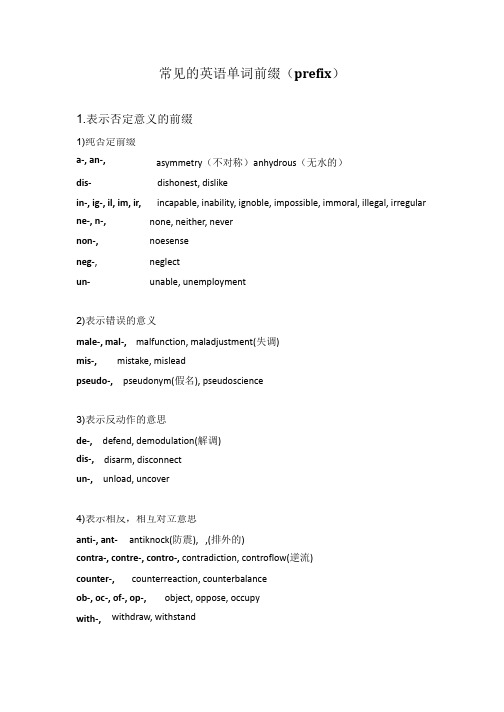
常见的英语单词前缀(prefix)1.表示否定意义的前缀1)纯否定前缀a-, an-, asymmetry(不对称)anhydrous(无水的)dis- dishonest, dislikein-, ig-, il, im, ir, ne-, n-,non-,incapable, inability, ignoble, impossible, immoral, illegal, irregular none, neither, nevernoesenseneg-, neglectun- unable, unemployment2)表示错误的意义male-, mal-, malfunction, maladjustment(失调) mis-, mistake, misleadpseudo-, pseudonym(假名), pseudoscience 3)表示反动作的意思de-, dis-, un-, defend, demodulation(解调) disarm, disconnect unload, uncover4)表示相反,相互对立意思anti-, ant- antiknock(防震), ,(排外的)contra-, contre-, contro-, contradiction, controflow(逆流) counter-, counterreaction, counterbalanceob-, oc-, of-, op-, object, oppose, occupywithdraw, withstandwith-,2.表示空间位置,方向关系的前缀1)a-表示“在……之上”,“向……”2)by-表示“附近,邻近,边侧”aboard, aside, bypath, bypass(弯路)3)circum-, circu-,表示“周围,环绕,回转” circumstance, circuit4)de-,表示“在下,向下” descend, degrade5)en-,表示“在内,进入” encage(禁闭), enbed(上床)6)ex-, ec-, es-,表示“外部,外” exit, eclipse, expand, export7)extra-,表示“额外”extraction(提取)8)fore-表示“在前面” forehead, foreground9)in-, il-, im-, ir-,表示“向内,在内,背于” inland, invade, inside, import10)inter-, intel-,表示“在……间,相互” international, interaction, internet11)intro-,表示“向内,在内,内侧”introduce, introduce12)medi-, med-, mid-,表示“中,中间” Mediterranean, midposition13)out-,表示“在上面,在外部,在外” outline, outside, outward14)over-,表示“在上面,在外部,向上”15)post-,表示"向后,在后边,次”overlook, overhead, overboard postscript(附言),16)pre-,表示"在前”在前面”17)pro-,表示“在前,向前”prefix, preface, preposition progress, proceed,18)sub-, suc-, suf-, sug-, sum-, sup-, sur-, sus-,表示“在下面,下”subway, submarine, suffix, suppress, supplement19)super-, sur-,表示“在…..之上”superficial, surface, superstructure20)trans-,表示“移上,转上,在那一边”21)under-,表示“在…..下面,下的”22)up-,表示“向上,向上面,在上”translate, transform, transoceanic underline, underground, underwater upward, uphold, uphill(上坡)3.表示时间,序列关系的前缀1)ante-, anti-,表示“先前,早于,预先”antecedent, anticipate,2)ex-,表示“先,故,旧”expresident, exhusband3)fore-,表示“在前面,先前,前面”foreward, dorecast, foretell(预言)4)mid-, medi-,表示“中,中间”midnight, midsummer5)post-"表示“在后,后”postwar,6)pre-, pri-,表示“在前,事先,预先”preheat, prewar, prehistory7)pro-,表示“在前,先,前”(序幕),prophet(预言家)8)re-,表示“再一次,重新”retell, rewrite4.表示比较程度差别关系的前缀1)by-,表示“副,次要的”byproduct, bywork(副业)2)extra-,表示“超越,额外”extraordinary,3)hyper-表示“超过,极度”hypersonic(超声波), hypertesion(高血压)4)out-,表示“超过,过分”outdo(超过), outbid(出价过高的人)5)over-,表示“超过,过度,太”overeat, overdress, oversleep6) sub-, suc-, sur-,表示“低,次,副,亚”subeditor, subordinate, subtropical(亚热带)7)super-, sur-表示“超过”Supernature , superpower , surplus , surpass8)under-,表示“低劣,低下”undersize, undergrown, underproduction(生产不足)9)vice-表示“副,次”vicepresident,5.表示共同,相等意思的前缀1)com-, cop-, con-, cor-, co-表示“共同,一起”。
常见的英语单词前缀

常见的英语单词前缀(prefix)1.表示否定意义的前缀1)纯否定前缀a-, an-, asymmetry(不对称)anhydrous(无水的)dis-dishonest, dislikein-, ig-, il, im, ir,incapable, inability, ignoble, impossible, immoral, illegal, irregular ne-, n-, none, neither, nevernon-, noesenseneg-, neglectun-unable, unemployment2)表示错误的意义male-, mal-,malfunction, maladjustment(失调)mis-,mistake, misleadpseudo-,pseudonym(假名), pseudoscience3)表示反动作的意思de-,defend, demodulation(解调)dis-, disarm, disconnectun-,unload, uncover4)表示相反,相互对立意思anti-, ant-antiknock( 防震), antiforeign ,(排外的)contra-, contre-, contro-,contradiction, controflow(逆流)counter-, counterreaction, counterbalanceob-, oc-, of-, op-,object, oppose, occupywith-, withdraw, withstand2. 表示空间位置,方向关系的前缀1)a- 表示“在……之上”,“向……”aboard, aside,2)by- 表示“附近,邻近,边侧”bypath, bypass(弯路)3)circum-, circu-, 表示“周围,环绕,回转”circumstance, circuit4)de-, 表示“在下,向下”descend, degrade5)en-, 表示“在内,进入”encage(禁闭), enbed(上床)6)ex-, ec-, es-, 表示“外部,外”exit, eclipse, expand, export7)extra-, 表示“额外”extraction (提取)8)fore- 表示“在前面”forehead, foreground9)in-, il-, im-, ir-, 表示“向内,在内,背于”inland, invade, inside, import10)inter-, intel-, 表示“在……间,相互”international, interaction, internet11)intro-, 表示“向内,在内,内侧”introduce, introduce12)medi-, med-, mid-, 表示“中,中间”Mediterranean, midposition13)out-, 表示“在上面,在外部,在外”outline, outside, outward14)over-, 表示“在上面,在外部,向上”overlook, overhead, overboard15)post-, 表示"向后,在后边,次”postscript(附言),16)pre-, 表示"在前”在前面”prefix, preface, preposition17)pro-, 表示“在前,向前”progress, proceed,18)sub-, suc-, suf-, sug-, sum-, sup-, sur-, sus-, 表示“在下面,下”subway, submarine, suffix, suppress, supplement19)super-, sur-, 表示“在…..之上”superficial, surface, superstructure20)trans-, 表示“移上,转上,在那一边”translate, transform, transoceanic21)under-, 表示“在…..下面,下的”underline, underground, underwater22)up-, 表示“向上,向上面,在上”upward, uphold, uphill(上坡)3. 表示时间,序列关系的前缀1)ante-, anti-, 表示“先前,早于,预先”antecedent, anticipate,2)ex-, 表示“先,故,旧”expresident, exhusband3)fore-, 表示“在前面,先前,前面”foreward, dorecast, foretell(预言)4)mid-, medi-, 表示“中,中间”midnight, midsummer5)post-"表示“在后,后”postwar,6)pre-, pri-, 表示“在前,事先,预先”preheat, prewar, prehistory7)pro-, 表示“在前,先,前”prologue (序幕),prophet(预言家)8)re-, 表示“再一次,重新”retell, rewrite4. 表示比较程度差别关系的前缀1)by-, 表示“副,次要的”byproduct, bywork(副业)2)extra-,表示“超越,额外”extraordinary,3)hyper- 表示“超过,极度”hypersonic(超声波), hypertesion(高血压)4)out-,表示“超过,过分”outdo(超过), outbid(出价过高的人)5)over-,表示“超过,过度,太”overeat, overdress, oversleep6) sub-, suc-, sur-, 表示“低,次,副,亚”subeditor, subordinate, subtropical(亚热带)7)super-, sur- 表示“超过”Supernature , superpower , surplus , surpass8)under-,表示“低劣,低下”undersize, undergrown, underproduction(生产不足)9)vice- 表示“副,次”vicepresident, vicechairman5. 表示共同,相等意思的前缀1)com-, cop-, con-, cor-, co- 表示“共同,一起”。
- 1、下载文档前请自行甄别文档内容的完整性,平台不提供额外的编辑、内容补充、找答案等附加服务。
- 2、"仅部分预览"的文档,不可在线预览部分如存在完整性等问题,可反馈申请退款(可完整预览的文档不适用该条件!)。
- 3、如文档侵犯您的权益,请联系客服反馈,我们会尽快为您处理(人工客服工作时间:9:00-18:30)。
英语单词前缀
一.表示否定的前缀
1.dis-加在名词、形容词,动词之前。
例词:disadvantage(缺点)dishonorable(不光彩的)disagree(不同意)
2.in-加在形容词,名词之前例词: incorrect(不正确的),inability(无能,无力),inaccurate(不准确的)3.im-加在字母m,b,p之前例词:impossible(不顺能的),impolite(不礼貌的),impudence(厚颜无耻)4.il-加在以1开头的词前例词:illegal(非法的),illiterate(文盲的,无文化的)illogical(不合逻辑的)5.ir-加在以r开头的词前例词:irregular(不稳定的),irresistable(不可抵抗的),
irresolvable(不能分解的不解决的)
6.un-加在名词,形容词,副词之前
例词:unfinished(未完成的)undoubted(无疑的)unemployment(失业)7.non-加在形容词,名词前
例词:non-existence(不存在),non-essential(不主要的),non-electrical(非电的)
8.mis-加在动词、名词之前
例词: misunderstand(误解),misjudge(误判),misleading(误导),misfortune(不幸)
9.dis-加地动词之前例词:disappear(消失),disarm(解除武装),disconnect(失去联系)
10.de-加在名词,形容词之前例词:demobilize(遣散;使…复员) decolor (脱色, 漂白)
11.anti-加在名词、形容词之前
例词:anti-Japanese(抗日战争),anti-social(厌恶社会的,反社会的),antidite(解毒药)
12.counter-加在名词、动词前
例词:counterattack(反攻,反击),counteract(抵抗,阻碍)counterrevolution(反革命)
二.表示“前”的前缀
1.pre-
例词:preconception(成见),pre-exsiting(先于……而存在的),pre-selection(选举前的) preface(前言)2.Ante- 例词:anteroom(前室,接待室),antecessor(先行者,先驱者)
3.Fore-
例词:forehaed(前额),foreground(前景),foreman(工头,领班),foresee(预见,先见),foretell(预言) 4.Pro- 例词:programme(计划),prologue(序幕)
5.Ex- 例词:ex-president(前任总统)ex-wife(前妻)
三.表示“后”的前缀
1.post- 例词:post-war(战后),post-position(后置词),postmeridian(下午)
四.表示“低”、“下”的前缀
1.Hypo- 例词:Hypocrisy(伪善,虚伪),hypothesis(假设),pypocholoride(次氯酸盐)
2.Infra- 例词:Infra-red(红外线),infrahuman(低于人类的),infrasonic(亚声的,次声的)3.Sub- 例词:Sub-editou(副编辑),sub-way(地铁),sub-conscious(下意识的),submarine(海下的),subtropical(亚热带的),subtitle(副标题)
五.表示“回”、“再次”、“向后”的前缀
1.Re-
例词:Refuel(给…加油),retranslate(再译),reinforce(加强),reconstruct(重建),return(返回)2.Retro-
例词:Retrograde(倒退的),retrospect(回顾)
六.表示“共同”、“和”的前缀
1.Co- 例词:co-exist(共存),co-operate(合作),co-education(男女同校)
七.表示“相互”、“之间”的前缀
1. Inter- 例词:Interchangeble(可互换的),interdipendert(互相依靠的),international(国际的),inter-national (交往)
八. 表示“出”、“超出”的前缀
1.Ec- 例词:Eclipse(蚀),ecstasy(狂想)
2.Extra- 例词: Extraordinary(非凡的),extramural(校外的),extrasensory(超感觉的)九.表示“超过”的前缀
1.hyper-, preter-, super-, sur-, ultra- 例词:hyper-sensitive(过敏的),preterhuman(超人的)十.其它的前缀
1.auto-自例词:automatic(自动的),auto-autobilgraphy(自传)
2.mal-坏,恶例词:Malnutrition(营养不良),maltreat(虐待)
3.Micro- 例词:Microscope(显微镜),microtome(切片机)
4.Tele-远例词:Telegram(电报),telephone(电话),telescope(望远镜)
5.Demi-,semi-hemi- 例词:Semi-circle(半圆),hemisphere(半球),demilune(半月,新月)6.Uni-, mono-(单一, 单独)例词:Monotone(单调),monologue(独白),uniform(制服)7.Bi-,di-二例词:Biyearly(二年一次的),biweekly(二周一次的),dichloride(二氯化物) 8.Tri-三例词:Triangle(三角),tripld(三角架)
9.Multi-多例词:multi-colored(颜色多样的),multi-national(多国的)
10.Poly –多例词:Polygon(多角形),polytomic(多原子的)
11.Arch-首领例词:archbishop(大主教),architect(建筑师)
12.bene-善,好例词:benefit(利益),benevolence(善意)
13.homo-同例词:homosexual(同性恋的),homograph(同形异义字)
14.neo新例词:neo-colonialism(新殖民主义),neolithic(新石器时代的)
15.ortho-正确,直例词:orthogonal(直角的),orthodox(正统)
16.philo-挚爱例词:philosopher(哲学家)
17.proto-原始例词:protohydrogen(初氢),prototype(原型),protoplasm(原生质)18.pseudo-假的, 伪的, 冒充的例词:pseudonym(匿名),pseudo-communism(假共产主义)
19.a-,ab-,abs-(只有在t,c之前)从,自
例词:avoid(避免),absent(缺少的),abstain(抑制),abstract(吸引)20.Apo-,aph-来自例词:apology(道歉,谢罪),apostle(倡言者,先驱)
21.se-分离例词:separation(分开),secure(安全的),sedition(煽动叛乱)
22.para-防例词:parachute(降落伞),
23.omni-所有的,公共的例词:omnibus(公共汽车),omnipotence(万能)
24.pan-全,泛例词:Pan-American(全美的),pancean(万灵药),panorama(风景的全貌;万花筒)25.panto-全例词:pantisocracy(乌托邦大同世界),pantoscopic(视野广大)
26.dia-通过,借以例词:diagonal(对角的),diagnosis(诊断),dialogue(对话)
27.Per-通过,彻底,不利例词:perambrlate(走来走去),perfect极好的
28.trans-通过,横过例词:transcript(抄本, 副本; 记录),translation(翻译),trxnsparent(透明的),transport
(运输),trans-plant(移植)
29.Com-,con-,cor-,col-共同,和,完全例词:comment(评论),compile(编辑),correlation(相互关系),
collect(收集),corruption(贪污腐败),collaborate(合作,合著)30.syn-共同例词:synonym(同义词),synchronization(同步),syntonic(谐振的),
synthetic(人工的,合成的)
31.meta-和,在……之后例词:metaphor(比喻),metaphysics(形而上学)
32.Cis-在这一边例词:cisatlantic(大西洋这边的)。
